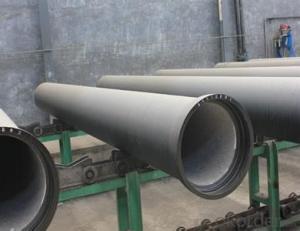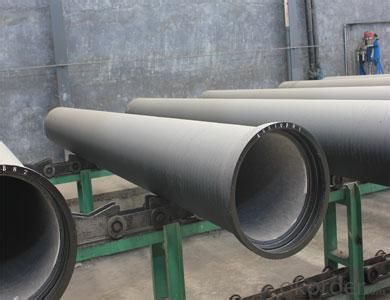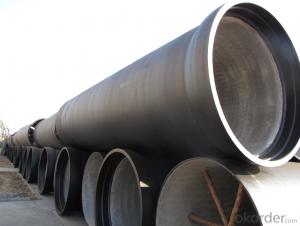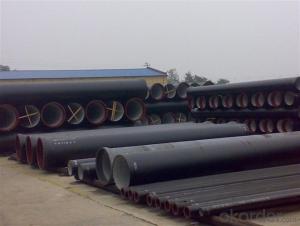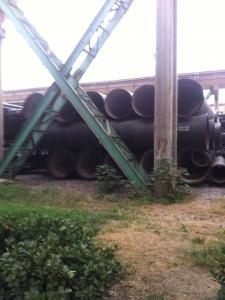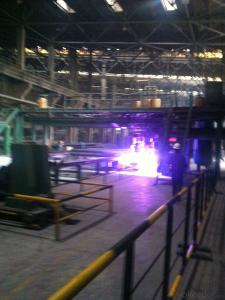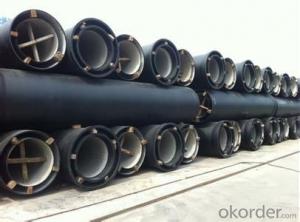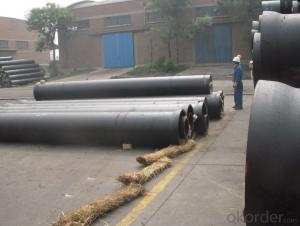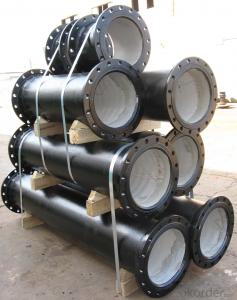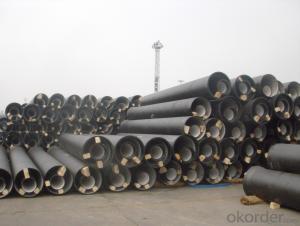DUCTILE IRON PIPES AND PIPE FITTINGS K8 CLASS DN600
- Loading Port:
- Tianjin
- Payment Terms:
- TT OR LC
- Min Order Qty:
- 22 pc
- Supply Capability:
- 3000 pc/month
OKorder Service Pledge
OKorder Financial Service
You Might Also Like
Material : Ductile Cast Iron
Size Range : DN 80mm to DN 2000mm
Unit Effective Length : 6m or 5.7m
Manufacture Standard: ISO 2531:1998/ EN 545:2006/EN 598:2007
Annual capacity : 200,000 tons
Coating Exterior: Zinc 130g/m2 according to ISO 8179-1 and bitumen coating 70 microns.
Cement Interior: Portland Cement/ High Alumina Cement/ Sulphate Resisting Cement Lining according to ISO 4179
Special requirements on external coating and internal lining can be applied
We also provide accessories such as SBR/EPDM rubber gaskets, lubricant paste, pipe caps, PE sleeves, etc.
Additional Parts:
Each pipe is strictly inspected according to related standard to ensure permanently high performance.
Easy Installation at site and service free for life
Long Service Lifespan
Quotation will arrive you within 24hours once we get your inquiry.
We guarantee offering you a competitive price.
A copy of original inspection reports of pipes will be offered after shipment.
Photos of loading process will be sent to the customer after shipment effect.
We will follow-up the delivery progress after shipment effect and update to the customer on weekly basis.
- Q: Can ductile iron be welded? Is weldability comparable to gray iron?
- Suitable for the full range of cold welding welding, welding cast iron base material can almost all, and it is easy to achieve cast iron and carbon steel dissimilar metal welding, such as solving matrix fracture, crack, wear, hole filling defects after welding can be machined, many applications in the engine casing, cylinder head, casting machine, gear base the tooth of iron castings.
- Q: Are ductile iron pipes suitable for installation in areas with high groundwater salinity?
- Ductile iron pipes are generally suitable for installation in areas with high groundwater salinity. Ductile iron is known for its corrosion resistance, making it a preferred choice for various applications, including water and wastewater systems. High groundwater salinity refers to an increased presence of dissolved salts in the water. While this can potentially cause corrosion in certain materials, ductile iron pipes are designed to withstand such conditions. Ductile iron pipes have a protective lining, typically made of cement mortar or polyurethane, which acts as a barrier between the pipe and the surrounding environment, including high salinity water. The lining helps to prevent any corrosive effects of the high groundwater salinity on the iron pipe, ensuring its long-term durability and reliability. Additionally, ductile iron pipes have a high tensile strength, allowing them to withstand external loads and pressure, even in challenging environments. It is important to note that the suitability of ductile iron pipes for areas with high groundwater salinity can also depend on factors such as the specific levels of salinity, the presence of other corrosive agents, and the overall design and installation practices. Therefore, it is recommended to consult with experts or engineers familiar with the local conditions to determine the most appropriate materials and precautions for specific installation projects.
- Q: What are the typical applications for ductile iron pipes?
- Due to their unique properties and advantages, ductile iron pipes are commonly utilized in a wide range of applications. Some of the typical uses for these pipes include the following: 1. Water Supply Systems: Ductile iron pipes are extensively employed in municipal water distribution networks and other water supply systems. They are highly resistant to corrosion and possess remarkable durability. Their ability to withstand high pressure and provide a long service life makes them ideal for transporting potable water. 2. Wastewater and Sewage Systems: Ductile iron pipes are also widely utilized in wastewater and sewage systems. Their strength and resistance to chemical corrosion enable them to effectively transport sewage and other wastewater. These pipes are commonly found in underground sewer lines, sewer force mains, and wastewater treatment plants. 3. Industrial Applications: Ductile iron pipes find applications in various industrial sectors. They are commonly used for transporting different types of fluids, such as chemicals, slurries, and abrasive substances. Their strength, toughness, and resistance to external loads make them suitable for industrial pipelines in power plants, refineries, and mining operations. 4. Irrigation Systems: Ductile iron pipes are frequently employed in irrigation systems for agricultural purposes, landscaping, and golf courses. These pipes can withstand high water pressure and provide a reliable solution for transporting water over long distances. Their corrosion resistance ensures that water quality is maintained, while their durability reduces the need for frequent maintenance. 5. Fire Protection Systems: Ductile iron pipes are widely used in fire protection systems, including sprinkler systems and fire hydrants. Their strength and ability to withstand high pressure make them suitable for quickly delivering water during fire emergencies. Additionally, these pipes are resistant to heat, making them a reliable choice for fire protection applications. In conclusion, ductile iron pipes are versatile and extensively used in various applications, including water supply systems, wastewater and sewage systems, industrial pipelines, irrigation systems, and fire protection systems. Their durability, corrosion resistance, and ability to withstand high pressure make them a preferred choice for these applications.
- Q: Can ductile iron pipe be used for gas distribution systems?
- Indeed, gas distribution systems can utilize ductile iron pipe. Ductile iron, being a robust and enduring substance, exhibits resistance to corrosion, thus rendering it suitable for subterranean applications. Its capacity to endure high pressure and furnish a dependable and enduring solution has led to its widespread employment in gas distribution systems for numerous years. Moreover, ductile iron pipes are acknowledged for their pliability, facilitating simpler installation and upkeep. Nevertheless, it is imperative to guarantee conformity with the specific requirements and standards of gas distribution systems when implementing ductile iron pipes to ensure the system's safety and efficiency.
- Q: How are ductile iron pipes protected against interior corrosion?
- Ductile iron pipes are protected against interior corrosion through a process called cement-mortar lining. This involves applying a thick layer of cement mortar to the interior surface of the pipes, which acts as a protective barrier against corrosion caused by the flow of water or other substances. Additionally, corrosion-resistant coatings can also be applied to the pipes to provide further protection.
- Q: Do ductile iron pipes require concrete encasement for support?
- No, ductile iron pipes do not typically require concrete encasement for support. Ductile iron pipes have sufficient strength and flexibility to support their own weight and withstand typical loads without the need for additional concrete encasement.
- Q: Are ductile iron pipes resistant to corrosion?
- Yes, ductile iron pipes are resistant to corrosion. Ductile iron is a type of cast iron that has been treated with additional materials to make it more flexible and durable. These materials, such as graphite, magnesium, and cerium, create a protective barrier on the surface of the pipe, making it highly resistant to corrosion. Additionally, ductile iron pipes are often coated with a layer of cement mortar or a fusion-bonded epoxy coating, further enhancing their resistance to corrosion. This makes ductile iron pipes suitable for use in various applications, including water distribution, wastewater treatment, and industrial pipelines, where corrosion is a common concern.
- Q: Are ductile iron pipes suitable for use in hydropower projects?
- Yes, ductile iron pipes are suitable for use in hydropower projects. Ductile iron pipes are known for their strength, durability, and resistance to corrosion, making them ideal for carrying water in hydropower projects. Additionally, their ability to withstand high pressure and adaptability to various ground conditions further supports their suitability for such projects.
- Q: What do ductile iron pipes need to connect with three? Can I contact it directly?
- Old craft1. dozen to lead lead; cut into strips, with a file play in the interface2. use expanded cement with asbestos3 use the asphalt
- Q: What is the difference between a PE fire hose and a ductile iron pipe?
- Seamless steel pipe: a pipe with a hollow cross section, used as a conduit for transporting fluids, such as pipelines for transporting petroleum, natural gas, gas, water, and certain solid materials. Compared withsteel and roundsteelinsolid, flexural torsional strength in the same time, the weight is light, is a kind of economic section steel, widely used in the manufacture of structural parts and mechanical parts, such as the oil pipe, automobile transmission shaft, the bicycle frame and steel construction with scaffold with steel pipe manufacturing ring parts can be improved the utilization rate of materials, simplify the manufacturing process, material saving and working hours, has been widely used to manufacture steel tube.
Send your message to us
DUCTILE IRON PIPES AND PIPE FITTINGS K8 CLASS DN600
- Loading Port:
- Tianjin
- Payment Terms:
- TT OR LC
- Min Order Qty:
- 22 pc
- Supply Capability:
- 3000 pc/month
OKorder Service Pledge
OKorder Financial Service
Similar products
Hot products
Hot Searches
Related keywords
